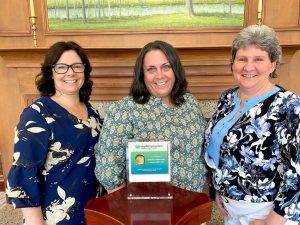
When you look at the leaves of a tree in late summer, do you notice anything different? How about in early fall? Sometimes it’s hard to see change as it happens. It can also be tempting to hope that this year… maybe winter just isn’t coming. But that’s not how weather patterns work. It’s not how the onset of dementia works either.
Slowly, often imperceptibly, what begins as everyday forgetfulness in an older family member can progress to full-blown dementia or Alzheimer’s disease without you realizing it. Is professional memory care needed? How would you know?
Fortunately, there are both commonsense and clinical criteria to help determine when memory care is needed for an individual’s safety and well-being. Let’s look closer at this challenging topic to make sure you’re prepared to intervene on behalf of a loved one living with dementia, if and when that moment arrives.
How it Begins
Dementia is a chronic disorder that progresses over a period of years. To a degree, the early stages are nearly identical to what’s considered a normal part of aging — difficulty remembering names, misplacing objects like eyeglasses and keys, occasional forgetfulness. But slowly — and not always — these signs can progress to the point where they impair a person’s ability to execute everyday tasks. If this is happening to your parent or older sibling, you’ll feel in your gut that something’s wrong.
You may notice that your loved one has difficulty finding the right words or can no longer carry on a conversation like they used to. You might see a decline in personal hygiene and a disinterest in connecting with people socially. Typically, older individuals and their grown children will rationalize these early signs and simply chalk them up to the vicissitudes of growing older. But if the signs worsen, families will be forced to address them.
Early Signs of Impending Dementia
- Decline in daily hygiene
- An absence of routine housekeeping
- Disinterest in lifelong hobbies and pastimes
- Social withdrawal
- Trouble following directions
- An apparent inability to read and comprehend
- A noticeable change in language skills
- Repeating simple questions
- Inability to identify family members in photographs
- Finding spoiled food or pet waste in the residence
Mid-Stage Signs That Require Immediate Action
- Forgetting medications or taking too much
- Leaving burners or appliances on
- Forgetting to eat, leading to steady weight loss
- Confusion and disorientation
- Episodes of wandering and becoming lost
- Bruises they can’t explain or remember getting
- Verbal abuse or accusations
- Displays of agitation or aggression
- Close calls or accidents associated with driving
Investigate Early
Allowing a family member’s cognitive ability to decline to the point you’re concerned for their safety is unwise and unnecessary. And when you consider the many trip hazards, fall risks, household chemicals, kitchen appliances, and even the possible presence of firearms in the home, you’ll realize that caring for a dementia patient at home involves risk that requires significant safety modifications. As difficult as discussions with siblings can be on this topic, it’s incumbent on you to intervene when a loved one with dementia or Alzheimer’s disease can no longer live safely alone. You can avoid this moment of crisis by involving professionals long before it arrives.
A primary care physician or geriatrician can perform simple, in-office tests as soon as you start noticing signs that concern you. The results of these tests will provide a baseline for the doctor to monitor and measure whether disease is present and how quickly it’s progressing. The doctor will perform a brief mental status exam using exercises that measure short-term recall, concentration and spatial awareness. Your loved one may be asked to name objects properly or repeat words spoken by the doctor and then remember them later in the appointment. The exercises might involve adding and subtracting numbers or spelling simple words backward. The doctor will also assess the individual’s understanding of visual and spatial cues, such as the distance and location of objects.
By discussing the challenges of dementia early, you give your family member the chance to be part of the conversations and decisions that lead to senior living or memory care. The feelings of inclusion and autonomy this affords are also helpful to the person’s transition to care.
Consider Professional Memory Care
The level of care you’ll find in today’s memory care facilities is designed to optimize quality of life even as cognitive abilities decline. A good memory care community will offer 24/7 care from a professional staff specially trained in the care of those suffering from dementia or Alzheimer’s disease. Some senior living communities focus solely on memory care, while others, like continuing care retirement communities, have a dedicated memory care unit or neighborhood. Generally speaking, residents in these communities take less medication, have a reduced risk of falls and injuries, show improved wellness and overall nutrition, enjoy greater independence, and require fewer visits to the hospital. By choosing professional memory care services for your loved one, you’re ensuring they’ll receive the caliber of care they deserve in an environment specifically suited to their needs.
Explore Person-Centered Memory Care at Pomperaug Woods
When your loved one receives memory care at Pomperaug Woods, they benefit from our holistic support network. At the heart of our approach to memory care is a nationally recognized philosophy known as Heartfelt CONNECTIONS — A Memory Care Program® that promotes physical and emotional well-being; supports daily functioning; and maintains a sense of purpose, satisfaction, dignity, and quality of life. We encourage you to contact us with your questions about memory care and to schedule your personal tour.






No comment yet, add your voice below!